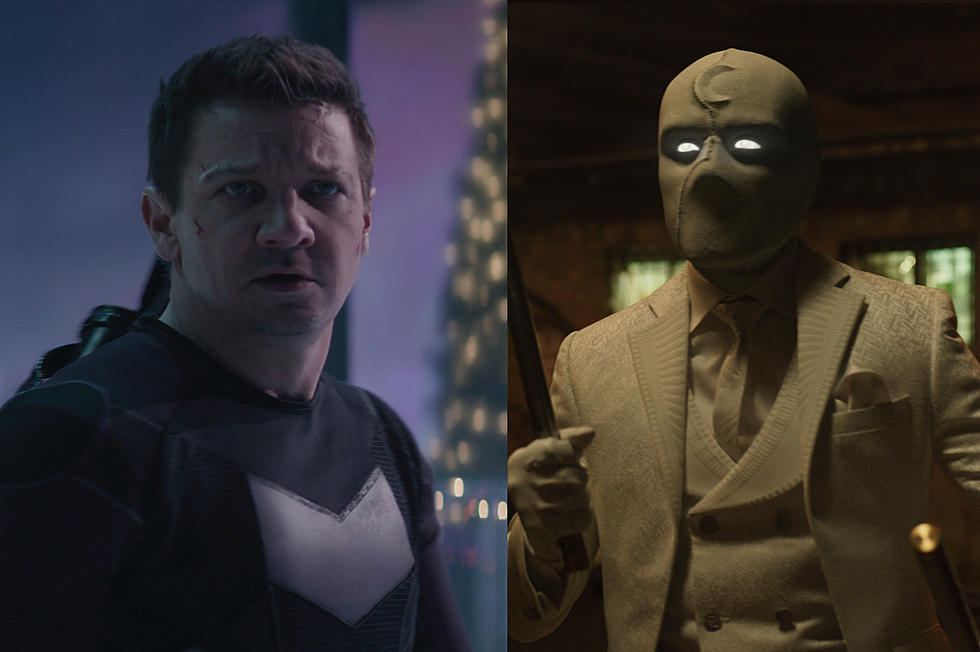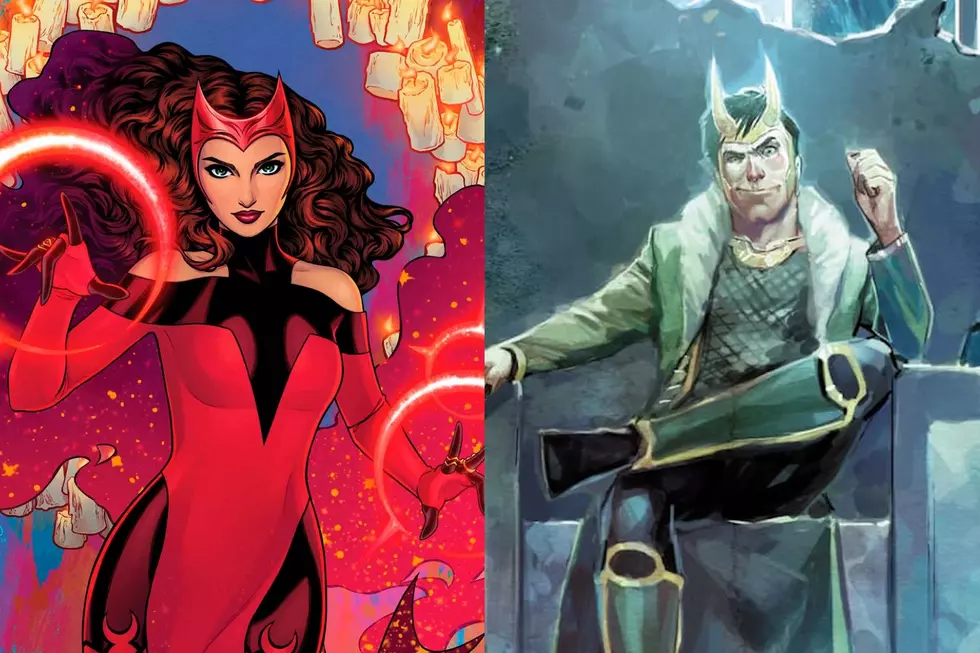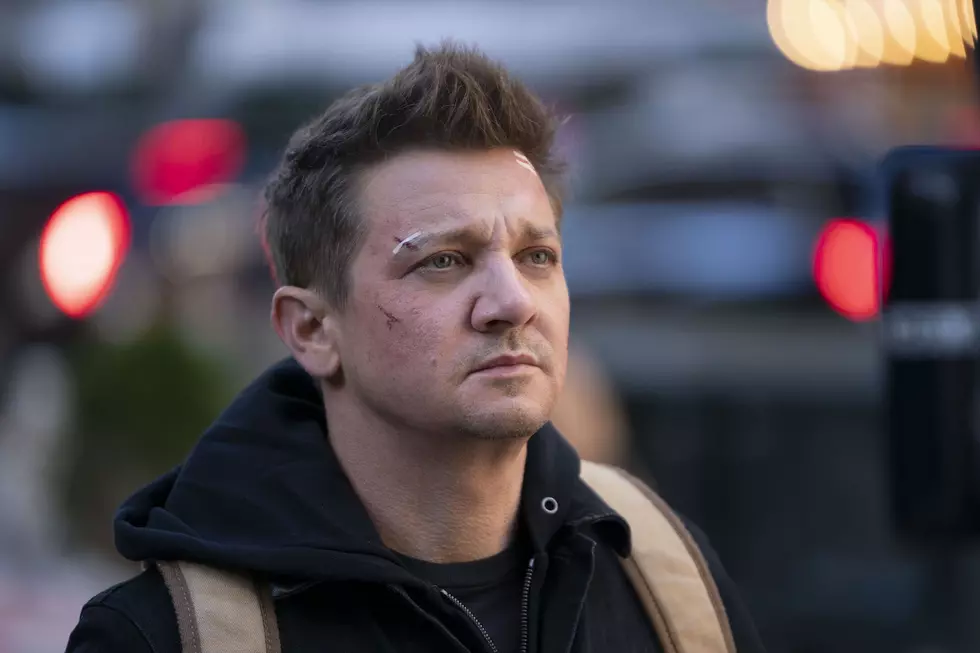
Every Marvel Disney+ Show Is Still About the Exact Same Thing
The following essay contains some SPOILERS for What If? and Hawkeye. It only talks in general terms about the basic premise of Moon Knight, though. If you’re worried about spoiling that, you’re good.
The first episode of Moon Knight introduces the world to Oscar Isaac’s Steven Grant, a humble museum gift-shop clerk who is clearly not right in the head. Sometimes he hears voices. Occasionally, he sees strange visions of bizarre creatures and supernatural beings. At night, he chains himself to his bed to make sure he doesn’t sleepwalk right out of his London flat.
As Moon Knight’s premiere unfolds, viewers come to realize what longtime Marvel Comics fans know: Steven suffers from dissociative identity disorder. Sometimes he’s Steven, and sometimes he’s Marc Spector, a brutal mercenary. And other times, both Marc and Steven become Moon Knight, a superhero who works to protect the innocent and avenge the guilty under orders from Khonshu, the Egyptian god of the moon.
Steven’s fractured psyche is echoed onscreen by endless shots of mirrors and reflections in puddles and windows. Everywhere he looks, Steven sees distorted duplicates of himself — and that’s before he begins fighting crime as a dude in a ghostly white cape and mask. How can he help others if he can’t even keep who he is straight most of the time?
While Moon Knight’s complex psychology comes straight from decades of Marvel Comics, the Marvel Cinematic Universe’s version of the character also continues a trend that began a year ago when Marvel Studios first began producing television series for Disney+. About midway through 2021, I observed and wrote about the fact that while the first three Marvel Disney+ shows — WandaVision, The Falcon and the Winter Soldier, and Loki — told very different stories, they were all about the theme of identity. Nine months and three more Marvel shows later, nothing has changed. Every show Marvel makes for Disney+ is still about the exact same thing.
It all started with WandaVision, a show about an enormously powerful witch (Elizabeth Olsen) who reinvents herself as a happy housewife in an attempt to shield herself from her grief over the loss of a loved one. That show also featured several other characters who undergo massive changes in their identities over the course of the series; like the Vision (Paul Bettany), who transforms from a colorful, loving husband, to an all-white, unfeeling robotic assassin, and Monica Rambeau (Teyonah Parris), a S.H.I.E.L.D. agent who winds up acquiring super powers after an encounter with a magical energy barrier. Even seemingly minor characters try on multiple identities over the course of the series, like Wanda’s neighbor Agatha Harkness (Kathryn Hahn) and the guy who shows up claiming to be her brother Pietro (Evan Peters).
The idea of shifting identities continued in The Falcon and the Winter Soldier, where three different characters — Sam Wilson (Anthony Mackie), Bucky Barnes (Sebastian Stan), and John Walker (Wyatt Russell) — fought for the right to call themselves Captain America, and to determine what being Captain America means and what values he represents. In Loki, the notion of multiple identities got even more literal, when the title character (Tom Hiddleston) got recruited by the Time Variance Authority to track down a “variant” of himself — and then encounters a whole league of different Lokis, including one that’s the President of the United States and another that’s an alligator.
Loki formally introduced the notion of a Marvel Cinematic Multiverse, along with the concept that there are an infinite number of variations of our favorite Marvel characters existing simultaneously in alternate timelines. That concept got expanded even further in the next Marvel Disney+ series, What If...?, which was an anthology series set within this new multiverse of Marvel. Because each episode had a different cast and a different focus — one week might follow a Black Panther who becomes Star-Lord, the next chronicles the life of a fun-loving Thor who grows up without a brother — the thing that united the entire series was this theme of identity, which each episode considering what parts of a person are malleable, and which ones are impossible to change.
One What If...?, for example, explored how the death of Hope Van Dyne might turn the heroic Hank Pym into a size-changing killer. In another episode, a zombie virus infects most of the Avengers, turning beloved heroes like Captain America and Iron Man into monstrous, flesh-eating beasts.
All of these shows also made the notion of “good guys” and “bad guys” in Marvel a lot more complicated than it had been in the previous phases of the MCU. WandaVision’s “hero” enslaves an entire New Jersey town as part of her twisted attempt to fix her life. In The Falcon and the Winter Soldier, the new Captain America becomes a cold-blooded murderer. In Loki, we begin to sympathize with the God of Mischief, and see his previous misbehavior in a whole new light. What If...? introduced a variant of Doctor Strange becomes so consumed with his quest for power that he ultimately destroys his entire universe.
When I first observed this unifying theme across all of Marvel’s Disney+ shows last year, I noted that it arrived at the same time Marvel’s own identity was in flux thanks to its move from movies to television. But even after they established themselves on television with those first shows, they continued hammering this theme in series after series. Hawkeye introduced the character of Echo (Alaqua Cox), an underworld enforcer who eventually comes to recognize she has been manipulated by her boss and then rejects his villainous ways. Hawkeye also featured multiple characters fighting over the identity of Hawkeye, with Hailee Steinfeld’s Kate Bishop repeatedly telling Jeremy Renner’s Clint Barton that she’s ready to fight alongside him as the new Hawkeye.
Each respective Hawkeye is uncertain about their own individual identities as well. Clint needs to decide whether continuing his work as a superhero is the right thing to do when he has a wife and kids at home. Kate was inspired to be a hero by Hawkeye’s actions during the events of The Avengers, but realizes a lot of what she believed about her mother (Vera Farmiga) was actually a lie.That brings us back to Moon Knight, which is just starting to unfold but has the idea of multiple identities baked right into its premise about a man with multiple personalities.
Marvel’s early movies were comparatively uninterested in this theme of identity. Where Marvel Comics spent decades exploring the physical toll and psychological tension of characters living two lives in and out of superhero costumes, Marvel movies abandoned that concept the moment Tony Stark publicly announced he was Iron Man at the end of his first movie. From that point forward, the MCU rarely paid much attention to whether Steve Rogers or Stephen Strange’ friends knew they were Avengers. In most cases, their identities were clear-cut, fixed, and not a source of conflict.
Some of the MCU Phase Four movies that followed this first wave of Marvel Disney+ series have changed that. Black Widow featured two versions of the title character; the new one, played by Florence Pugh, flirted with joining a mysterious group of anti-heroes (or outright supervillains?) that’s being assembled by Julia Louis-Dreyfus’ Valentina Allegra de Fontaine, and appeared on Hawkeye trying to murder the original Black Widow’s best friend, Clint Barton. In Spider-Man: No Way Home, Tom Holland’s Peter Parker spends the entire film grappling with the fact that the world knows he’s Spider-Man, then comes face to face with alternate versions of himself.
These ideas appear to be coming to a head in this summer’s Doctor Strange in the Multiverse of Madness, which promises to feature multiple Doctors Strange (including a bad guy like the one featured on What If...?) along with Wanda from WandaVision, plus alternate reality versions of Patrick Stewart’s Professor Xavier and who knows how many other Marvel heroes. Marvel also has an upcoming television series based on the comic Secret Invasion, where longtime Marvel heroes were revealed to be sleeper Skrull agents in disguise, and the movies Thor: Love and Thunder — which will feature multiple Thors — and Black Panther: Wakanda Forever, where a new character will be given the identity of Black Panther.
In other words, in the current MCU, identity isn’t a secret. It’s something that’s in a constant state of flux — and for some, it’s a veritable multiverse of madness.
New episodes of Moon Knight premiere Wednesdays on Disney+. Sign up for Disney+ here.
Every Marvel Disney+ Show, Ranked From Worst to Best

More From Mix 97.9 FM










